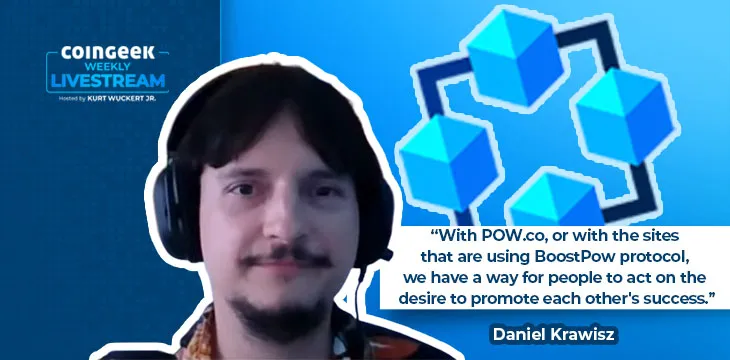|
Getting your Trinity Audio player ready...
|
Welcome to the third episode of the CoinGeek Weekly Livestream for 2023. This week, Kurt Wuckert Jr. talked to Daniel Krawisz of the Proof of Work Cooperative (POW.CO). Krawisz is a well-known figure in the BSV ecosystem and a true old-school Bitcoiner.
Introducing Daniel Krawisz and his work
For those who don’t know, Daniel Krawisz is a Bitcoin OG dedicated to the peer-to-peer electronic cash system Satoshi Nakamoto designed. He tells Wuckert he has moved countries, is now married, and has been working on multiple ways to utilize proof-of-work.
“It all goes back to the value of Bitcoin. It’s a kind of money that is a lot better than what we’ve had before,” he says.
The BoostPow protocol he is working on can make bad ideas quiet and good ideas loud, Krawisz says, noting that right now, it’s the other way around. BoostPow aims to remedy that.
Krawisz cites theories from evolutionary biology as informing his work, noting that one theory says that the only honest signal of fitness is a provable waste. He gives the analogies of antlers of peacock’s tails. These inhibit the animal from doing what it needs to do to survive, proving that it couldn’t endure these handicaps unless they were fit. He says that bad ideas proliferate with ease because there’s no cost to promoting them. Once a cost is introduced, it’s easier to prove which ideas are best, like a peacock with a beautiful tail, making it easier for the brain to identify good ideas and eliminate bad ones.
More details about the tools Krawisz is creating
Wuckert asks Krawisz to give us more details on some of the tools he and his team are creating.
Krawisz says the best thing to do is to go to POW.co to check them out. “That will lead you into some of the other websites,” he says. He likes to put all of his ideas in one big competition. He then begins to demonstrate some of these tools.
POWCO and BoostPOW
The first tool Krawisz demonstrates is POW.CO.
Showcasing the product, he shows how we can see the proof of work for the last day, week, month, and so on, using an interactive calendar. This gives us an overview of what sort of proof of work has gone on during that time frame.
Being a miner, Wuckert asks what his gain is to boost. “It’s a bounty system,” Krawisz says. He demonstrates how a user can select an idea, determine the difficulty and number of satoshis, and boost that idea. He shows a few other examples, including various Twetch posts and a Quora-like forum post. All these formats can be boosted at a cost, with the most valuable ones rising to the top.
Wuckert immediately sees the value in this, noting that it’s often difficult to prioritize what should be done first. Boosts could help solve this. Krawisz says this concept is actively at work in his own company; they prioritize the most boosted issues.
How could we stop a competitor from coming in and boosting ideas that are designed to waste our time? Krawisz replies that we should also mine boosts to make money from them, and he cites the incentives of the system; competitors would be wasting their own time and resources rather than using it to find out what they should be prioritizing.
Both agree that proof of work is a form of peaceful warfare. Participants show they’re willing to expend energy and resources to defend the system. “It’s more like potential warfare,” Krawisz says.
POWStream
A user asks Krawisz to explain his tool POWStream. He says to visit PowStream.com. He describes it as an overlay over YouTube with an added boost button, showing the top boosted videos of the week.
Instead of free likes, boosts are costly, helping to identify the most worthy videos. This ties in with Krawisz’s overarching ideas about costly signals.
On Austrian economics and libertarianism
Another user asks the question as to whether BoostPow is an extreme version of Austrian economics where the Austrians are right, but only in the long run.
Wuckert agrees but says he feels the libertarian ideas haven’t actually grown much in the last 20 years.
Krawisz says that while that’s true, the growth of these ideas is possible. He encourages libertarians to live as if the relationship between the elites and the state is a predator-prey relationship. He says that becoming an entrepreneur is the closest thing to freedom we can have within the current constraints; it’s like foraging in the wild versus living on the farm.
Questions and answers
Wuckert wraps the livestream by taking a few user questions:
Q. Is a boost limited to a static text/quote/pic/link?
A boost is limited to any tx id. If it doesn’t display correctly, it’s the job of Krawisz’s team to figure out how to display it. Boosting content to the top is the fastest way to get them to figure out how to support it.
Q. Would you say it’s a sort of billboard app where people can post stuff for a fee?
Krawisz says yes. He notes that this works the other way than people usually desire: instead of getting paid to post content, they are paying to post it. Many people wonder why they would do this. He says it’s a fair competition to get the top spots, helping people identify truly good ideas and information.
Q. Do you have a closing thought? How can anyone learn more about this?
Krawisz says that anyone who wants to learn more about this should follow the top content on POW.co. They also have a daily meeting in which you must have 100 POWCo tokens to attend.
Watch: The Next Big Thing: Incubating Start-Ups on the BSV Blockchain

 07-12-2025
07-12-2025 





